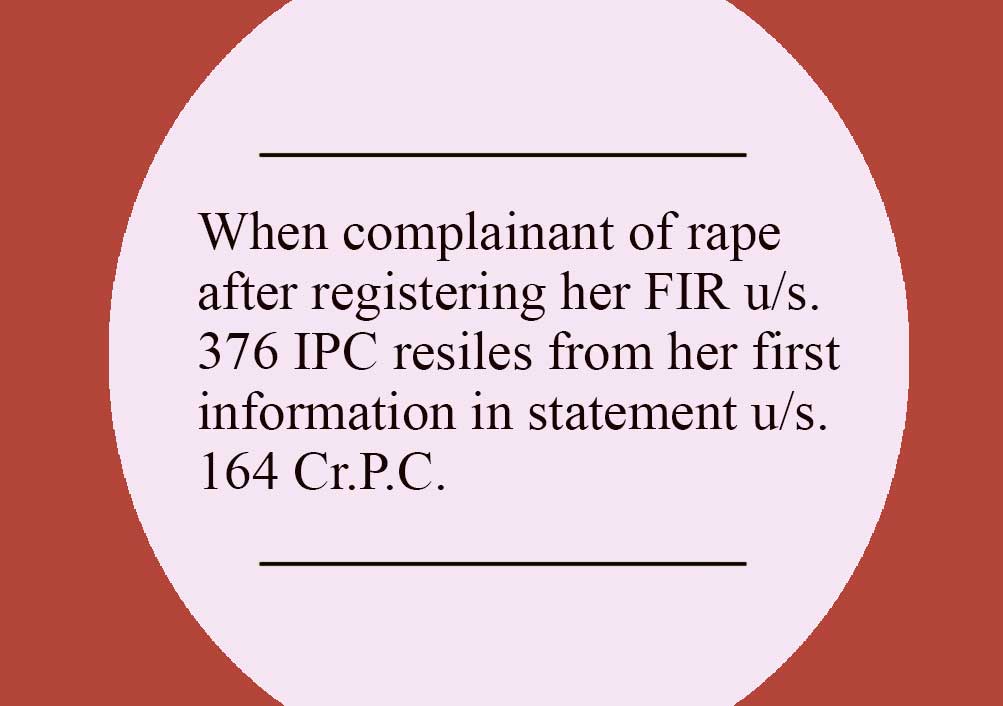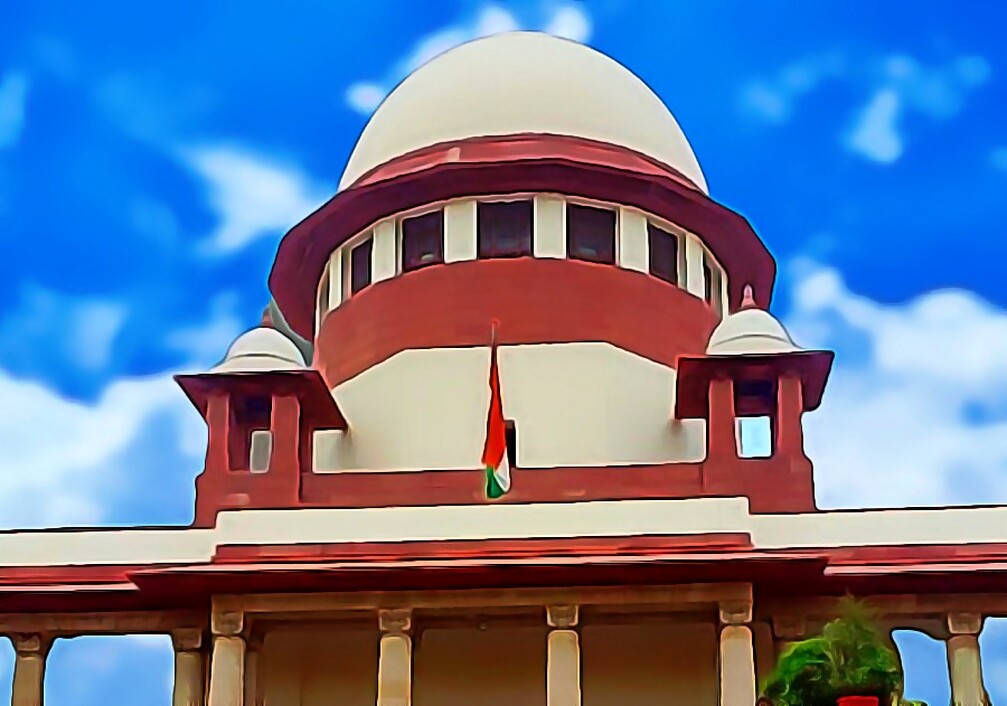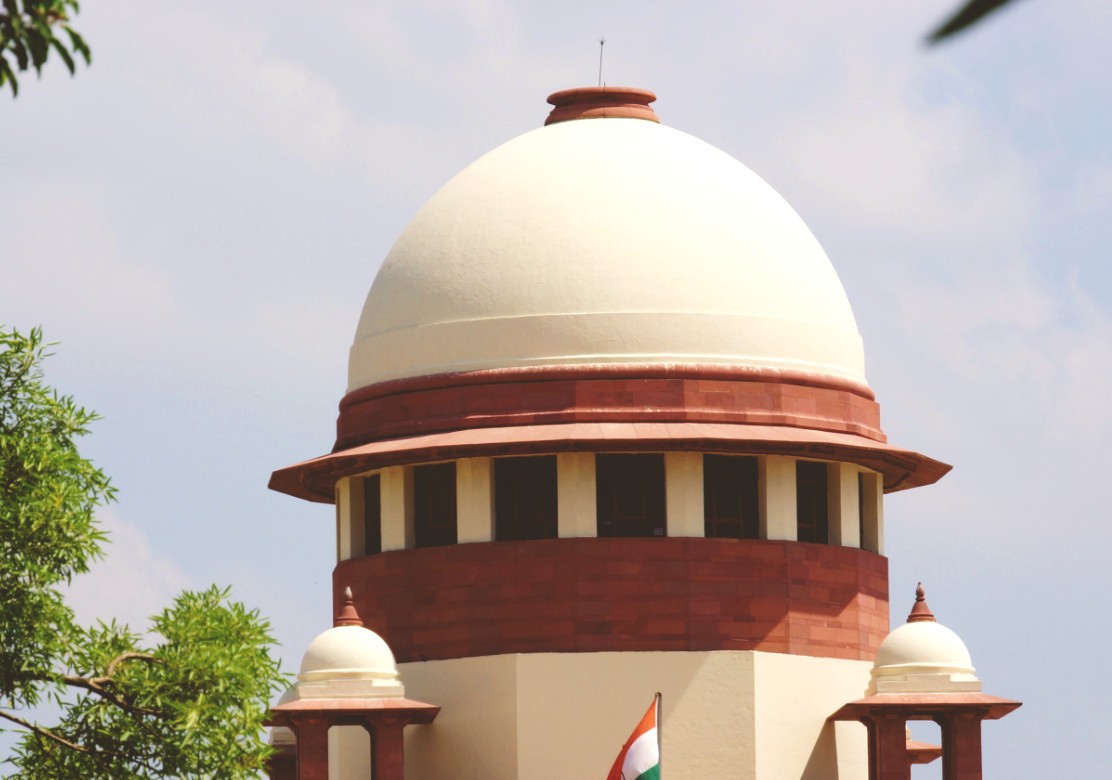Case Laws: When complainant of rape after registering her FIR u/s. 376 IPC resiles from her first information in statement u/s. 164 Cr.P.C.

Facts:
In the said case the petitioner seeks his release on bail in case FIR No. 250/2004 under Section 376 IPC. The petitioner faces accusation of subjecting his 13-year-old daughter to sexual abuse and rape.
It is argued that contrary to her statement to the police on the basis of which FIR was registered, in her subsequent statement under Section 164 Cr.P.C. before the Metropolitan Magistrate concerned she simply complained of not being provided with proper food by the petitioner with no allegation of alleged sexual assault and rape as reflected in her previous statement to the police.
Observation:
The court observed that before reporting the matter to the police on 28th July, 2004, the prosecutrix had earlier narrated the ordeal faced by her at the hands of the petitioner to her class teacher and relatives. Of course, in her subsequent statement under Section 164 Cr.P.C, the prosecutrix omits to reiterate her allegation of sexual abuse and rape by the petitioner, her statement initially made to the police preceded by narration of traumatic experience to her class teacher and others cannot be lost sight of.
Decision:
It was held that tampering with evidence by the petitioner on his enlargement on bail being not unlikely, request for bail is difficult to accede to. Plea for bail is, accordingly, declined and the petition is dismissed.
https://www.legitquest.com/case/anand-kumar-v-state-nct-of-delhi/21371
Facts:
In the instant case, prosecutrix sent a letter to SHO, Mahendra Park Police Station denying the allegations levelled by her in her earlier complaint. She moved an application before the learned Metropolitan Magistrate on 28.09.2015 to record her 164 Cr.P.C. statement. In her 161 Cr.P.C. statement recorded before the police, she reiterated that a false FIR was lodged by her to settle the dispute about her salary with the petitioner. Learned senior counsel urged that since the prosecutrix has retracted her earlier statement, there is no likelihood of conviction and continuance of the criminal proceedings against the petitioner would be an abuse of process.
Observations:
The High Court noted that the supplementary statement and the application moved before the SHO cannot be taken into consideration to throw away the earlier complaint of prosecutrix. The Court further added that it was to be ascertained during trial as to how and in what circumstances, the prosecutrix denied her earlier version or whether it was due to some threats or pressure, and it would be unsafe to quash the FIR/chargesheet on the basis of the prosecutrix’s retraction from her statement.
Decision:
Court held that settled position is that the power under Section 482 Cr.P.C. to quash the criminal proceedings must be exercised sparingly with circumspection. It should not be exercised to stifle a legitimate prosecution. The petition was accordingly dismissed.
https://www.legitquest.com/case/dilip-kumar-gupta-v-state-nct-of-delhi–another/A2C6B
Facts:
In the said case when the statement of the victim was recorded under section 164 of the Cr.P.C., she completely denied the story of gang rape and she had nowhere stated the name of the petitioner in her statement recorded under Section 164 of the Cr.P.C.. Rather, she stated that she had gone to see a temple along with co-accused Nanhaka and while they were standing near a tree, the local people caught them and pressurized the victim to lodge false case.
Decision:
The Court noted that considering the aforesaid statement of victim as well as submissions of the parties, let the petitioner be released on bail on furnishing bail bonds of Rs. 10,000/- with two sureties of the like amount each to the satisfaction of learned Special Judge.
https://www.legitquest.com/case/rakesh-kumar-v-the-state-of-bihar/1E5424
4. State (Govt. of NCT of Delhi) vs. Shyam Sunder — District Court
Facts:
In the said case, the prosecutrix alleged that for some days, the accused had been beating and molesting her. On 14.06.2008, at about 2.00 am, accused committed sexual intercourse with her forcibly and left the house early in the morning. On her statement, a case was registered vide FIR No. 305/08 at the police station Mehrauli. On 26.06.2008, she gave her statement under section 164 CrPC before the Magistrate stating therein that she had given a false statement to the police. The accused had only abused and beat her. She denied that the accused had raped her. On the basis of the statement, a cancellation report was filed. After getting notice, the prosecutrix filed her objections and thereafter, the case was directed to be further investigated. During investigation, the statement of the prosecutrix was again recorded, wherein she alleged that she was raped by the accused.
Observation:
It was observed that the accused has been able to raise suspicion on the veracity of this witness as in her statement which was recorded u/s 164 CrPC she has categorically stated that the accused did not commit rape but when he refused to marry, she again made complaint after a few months making similar allegations reiterating the incident in FIR No. : 305/08 U/s.: 376, her subsequent statement recorded u/s 164 CrPC.
The court observed that the conviction in such cases can be made on the sole testimony of the prosecutrix and the version of the victim in rape commands great respect and acceptability but if there are some circumstances which cast doubts in the mind of the court of the veracity of the victim’s evidence then it is not safe to rely on the sole testimony of the victim of rape.
It was held in case of Rajoo Vs. State of MP [AIR 2009 SC 858] : “It cannot be lost sight of that rape causes the greatest distress and humiliation to the victim but at the same time a false allegation of rape can cause equal distress, humiliation and damage to the accused as well. The accused must also be protected against the possibility of false implication, particularly where a large number of accused are involved. It must, further, be borne in mind that the broad principle is that an injured witness was present at the time when the incident happened and that ordinarily such a witness would not tell a lie as to the actual assailants, but there is no presumption or any basis for assuming that the statement of such a witness is always correct or without any embellishment or exaggeration”
It was held in the case of Dev Kumar Juneja Vs. The State (Delhi Administration) 1996 4 AD (Delhi) 527 that law on the question of variance between different statements of a witness at different stages is that small variations or omissions will not justify a finding that the witness is a liar and his testimony be discarded. However, vital omissions merit consideration and if on points it appears to the court that witness has tried to improve the case, such a witness will have to be discarded. The cases of Surajamal Vs. State, AIR 1979 SC 1408, Matadin and ors. Vs. State of UP, AIR 1979 SC 1234 and Namdeo Daulate etc. Vs. State of Maharashra, AIR 1977 SC 381 were also relied upon.
In the case of Narender Kumar Vs. State of NCT Of Delhi AIR 2012 SC 2281, it was observed:
The courts while trying an accused on the charge of rape, must deal with the case with utmost sensitivity, examining the broader probabilities of a case and not get swayed by minor contradictions or insignificant discrepancies in the evidence of witnesses which are not of a substantial character. However, even in a case of rape, the onus is always on the prosecution to prove affirmatively each ingredient of the offence it seeks to establish and such onus never shifts.
Decision:
The court held that the present case is not free from suspicion and it would be highly unsafe to base the conviction of the accused on the basis of the evidence and material available on record. The court therefore acquitted the accused of the offence punishable under section 376 IPC.
5. https://www.tribuneindia.com/news/chandigarh/%E2%80%98rape-victim%E2%80%99-retracts-statement-11058
As reported, the girl retracted the charges while she was recording the statement under Section 164 of the CrPC in front of the magistrate. The victim told the magistrate that the rape never happened, denying her initial statement. This happened a day after the initial complaint was filed. Despite the denial of the rape charge by the 20-year-old victim, the police will continue with its inquiry.
6. http://archive.indianexpress.com/news/-rape-victim–in-trouble-for-turning-hostile/504712/
As reported, a city court has started a criminal trial against an alleged rape victim for turning hostile before a sessions court — five years after she had complained of rape. The woman initially told a magistrate that the accused had raped her in February 2002, when she was a minor. Her statement was recorded under Section 164 of the CrPC. Later, when she took the witness box during trial, she turned hostile and denied rape. She also said she had made her previous statement to the magistrate under pressure from a police officer. Despite attempts by the prosecution, the woman refused to stand by her original complaint. Additional Sessions Judge Narinder Kumar absolved the accused Vijay Kumar of rape charges on May 16, 2007. While acquitting Kumar, the judge noted that the complainant had done a volte-face from her earlier statement given to a magistrate, thereby abusing the process of the court. The sessions court then turned complainant and sent a formal request to the Additional Chief Metropolitan Magistrate (ACMM), Rohini, to register a case against the woman under Section 193 (punishment for false evidence).
Sign up for our weekly newsletter to stay up to date on our product, events featured blog, special offer and all of the exciting things that take place here at Legitquest.




Add a Comment